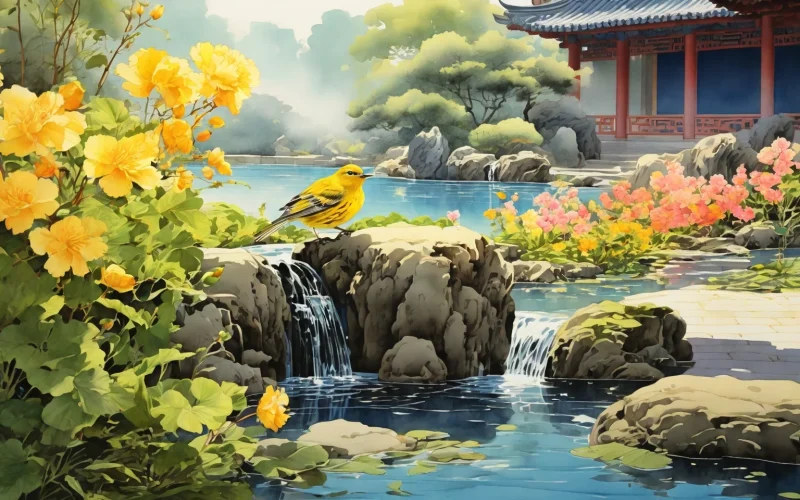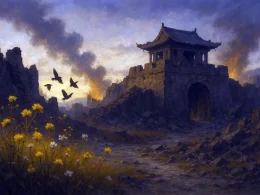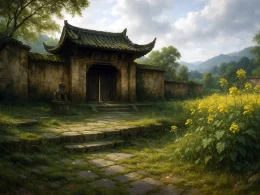Fame renounced, I dwell at ease—
Why must one chase Canglang’s seas?
Herbs I plant in deep shade thrive,
Closed gates make noise forget to strive.
Woods’ slumber teems with dawn’s faint dreams,
Crows scatter, startled by sunbeams.
A flake of snow with dark clouds sails,
Whirlwinds steal fruit-scent from the vales.
Our next meet waits where blue skies end—
Yet wistful, I scent orchids bend.
Original Poem
「闲居寄包何」
钱起
去名即栖遁,何必归沧浪。
种药幽不浅,杜门喧自忘。
林眠多晓梦,鸦散惊初阳。
片雪幽云至,回风邻果香。
佳期碧天末,惆怅紫兰芳。
Interpretation
This poem was composed during the Mid-Tang period when Qian Qi was living in reclusion, dedicated to his friend Bao He. Bao, a literary companion of similarly refined and reclusive temperament, shared the poet's ideals. Through depicting the serene simplicity of hermetic life, the poem expresses Qian's aspiration to transcend worldly clamor and commune with nature, while also conveying longing and spiritual resonance with his friend. The verses, understated yet profound, blend scene and sentiment seamlessly, embodying the quintessential mountain-forest ethos and spiritual pursuits of High Tang literati.
First Couplet: "去名即栖遁,何必归沧浪。"
Qù míng jí qī dùn, hé bì guī cāng láng.
Since renouncing fame for retreat,
Why must one return to "Canglang's waters"?
The opening establishes the recluse's mindset, alluding to the Fisherman ode's "Canglang waters"典故 (symbol of reclusion). The rhetorical question underscores spiritual freedom beyond physical locales—true detachment transcends geographical signifiers.
Second Couplet: "种药幽不浅,杜门喧自忘。"
Zhòng yào yōu bù qiǎn, dù mén xuān zì wàng.
Tending medicinal herbs in deep seclusion,
Closed gates make worldly noise fade unremembered.
Daily hermetic rituals—herb-gardening and door-shutting—epitomize complete withdrawal from society's bustle, with "unremembered" implying profound inner stillness.
Third Couplet: "林眠多晓梦,鸦散惊初阳。"
Lín mián duō xiǎo mèng, yā sàn jīng chū yáng.
Forest slumber brims with dawn-lit dreams;
Scattering crows startle the newborn sun.
Morning's hush and sudden movement intertwine: tranquil dreams and avian disruption paint a vivid, understated tableau of mountain solitude, where mundane moments brim with poetic resonance.
Fourth Couplet: "片雪幽云至,回风邻果香。"
Piàn xuě yōu yún zhì, huí fēng lín guǒ xiāng.
A wisp of snow arrives with stealthy clouds;
Swirling winds bear a neighbor's fruit fragrance.
Nature's delicate phenomena—ephemeral snow, drifting clouds, fruit-scented breezes—curate an environment both pristine and vibrantly alive, celebrating reclusion's sensory joys.
Fifth Couplet: "佳期碧天末,惆怅紫兰芳。"
Jiā qī bì tiān mò, chóu chàng zǐ lán fāng.
Our reunion waits at heaven's blue edge—
Melancholy sweet as purple orchids' perfume.
The conclusion wistfully projects longing onto the horizon. "Purple orchids," traditional emblems of virtuous friends, symbolize both the absent Bao and the shared ideals that bind them—a fragrant sorrow lingering between the lines.
Holistic Appreciation
This is a quintessential recluse lyric, painting a tranquil mountain retreat through delicate imagery—"cultivating herbs," "closed doors," "dawn dreams," "fruit fragrance"—all reflecting the poet’s serene detachment from worldly clamor. Subtle longing for his friend Bao He permeates the verses, culminating in the poignant closing lines: "Fine days at the sky’s edge, / Melancholy lingers on purple orchids." The poem’s gentle yet lofty tone, understated yet elegant diction, blends Tao Yuanming’s pastoral charm with the High Tang literati’s leisurely spirit.
Artistic Merits
- Subtle Language, Ethereal Mood: Without a single harsh word, its mellow phrasing and quiet depth evoke an ancient, transcendent aesthetic.
- Scene-Emotion Fusion: Nature becomes emotion’s vessel—dreams, snow, clouds, and fruit scents merge seamlessly with the poet’s inner world.
- Precise Structure, Layered Progression: From resolve to daily rhythms, dawn scenes to landscapes, then friend-directed yearning—each transition is crystalline.
- Allusive Nuance, Organic Flow: The opening’s "Canglang waters" allusion and closing "purple orchids" (symbolizing friendship) weave cultural resonance effortlessly.
Insights
The poem reveals High Tang scholars’ pursuit of spiritual freedom beyond fame. Qian Qi celebrates reclusion yet cherishes kinship, offering dual homage to quiet living and sincere bonds. It whispers: true peace springs from surrender to nature, while friendship transcends distance as a meeting of souls. Such pure, unhurried, yet profound expression remains a beacon—a solace and an ideal for modern seekers.
About the Poet
Qian Qi (钱起, c. 722-780), a native of Huzhou, Zhejiang, was the foremost of the "Ten Talents of the Dali Era" in mid-Tang poetry. His poetic style, inheriting Wang Wei's legacy, excelled particularly in regulated verse (五律), characterized by its ethereal elegance. Yan Yu praised his work as "innovative in form," reflecting the Dali period's transition from the High Tang's naturalism to refined craftsmanship.











